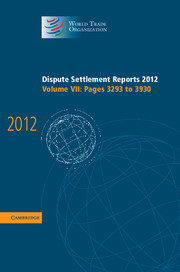Book contents
- Frontmatter
- TABLE OF CONTENTS
- CHINA – MEASURES RELATED TO THE EXPORTATION OF VARIOUS RAW MATERIALS
- Contents
- CASES CITED IN THESE REPORTS
- ABBREVIATIONS USED IN THESE REPORTS
- I INTRODUCTION
- II ARGUMENTS OF THE PARTICIPANTS AND THE THIRD PARTICIPANTS
- III ISSUES RAISED ON APPEAL
- IV THE PANEL'S TERMS OF REFERENCE
- V THE PANEL'S RECOMMENDATIONS
- VI APPLICABILITY OF ARTICLE XX
- VII ARTICLE XI:2(a) OF THE GATT 1994
- VIII ARTICLE XX(g) OF THE GATT 1994
- IX FINDINGS AND CONCLUSIONS IN THE APPELLATE BODY REPORT WT/DS394/AB/R
- X FINDINGS AND CONCLUSIONS IN THE APPELLATE BODY REPORT WT/DS395/AB/R
- XI FINDINGS AND CONCLUSIONS IN THE APPELLATE BODY REPORT WT/DS398/AB/R
- ANNEX I Request for the Establishment of a Panel by the United States, WT/DS394/7
- ANNEX II Request for the Establishment of a Panel by the European Communities, WT/DS395/7
- ANNEX III Request for the Establishment of a Panel by Mexico, WT/DS398/6
- ANNEX IV Notification of an Appeal by China, WT/DS394/11, WT/DS395/11, WT/DS398/10
- ANNEX V Notification of an Other Appeal by the United States, WT/DS394/12
- ANNEX VI Notification of an Other Appeal by the European Union, WT/DS395/12
- ANNEX VII Notification of an Other Appeal by Mexico, WT/DS398/11
- Contents
- TABLE OF WTO CASES CITED IN THESE REPORTS
- GATT DISPUTE SETTLEMENT AND WORKING PARTY REPORTS
- ABBREVIATIONS OF MEASURES, EVIDENCE, AND OTHER INSTRUMENTS REFERRED TO IN THIS RULING
- TABLE OF ABBREVIATIONS
- I INTRODUCTION
- II FACTUAL ASPECTS
- III PARTIES' REQUESTS FOR FINDINGS AND RECOMMENDATIONS
- IV ARGUMENTS OF THE PARTIES
- V ARGUMENTS OF THE THIRD PARTIES
- VI INTERIM REVIEW
- VII FINDINGS
- VIII CONCLUSIONS AND RECOMMENDATIONS
- Cumulative List of Published Disputes
VII - ARTICLE XI:2(a) OF THE GATT 1994
from CHINA – MEASURES RELATED TO THE EXPORTATION OF VARIOUS RAW MATERIALS
Published online by Cambridge University Press: 03 January 2018
- Frontmatter
- TABLE OF CONTENTS
- CHINA – MEASURES RELATED TO THE EXPORTATION OF VARIOUS RAW MATERIALS
- Contents
- CASES CITED IN THESE REPORTS
- ABBREVIATIONS USED IN THESE REPORTS
- I INTRODUCTION
- II ARGUMENTS OF THE PARTICIPANTS AND THE THIRD PARTICIPANTS
- III ISSUES RAISED ON APPEAL
- IV THE PANEL'S TERMS OF REFERENCE
- V THE PANEL'S RECOMMENDATIONS
- VI APPLICABILITY OF ARTICLE XX
- VII ARTICLE XI:2(a) OF THE GATT 1994
- VIII ARTICLE XX(g) OF THE GATT 1994
- IX FINDINGS AND CONCLUSIONS IN THE APPELLATE BODY REPORT WT/DS394/AB/R
- X FINDINGS AND CONCLUSIONS IN THE APPELLATE BODY REPORT WT/DS395/AB/R
- XI FINDINGS AND CONCLUSIONS IN THE APPELLATE BODY REPORT WT/DS398/AB/R
- ANNEX I Request for the Establishment of a Panel by the United States, WT/DS394/7
- ANNEX II Request for the Establishment of a Panel by the European Communities, WT/DS395/7
- ANNEX III Request for the Establishment of a Panel by Mexico, WT/DS398/6
- ANNEX IV Notification of an Appeal by China, WT/DS394/11, WT/DS395/11, WT/DS398/10
- ANNEX V Notification of an Other Appeal by the United States, WT/DS394/12
- ANNEX VI Notification of an Other Appeal by the European Union, WT/DS395/12
- ANNEX VII Notification of an Other Appeal by Mexico, WT/DS398/11
- Contents
- TABLE OF WTO CASES CITED IN THESE REPORTS
- GATT DISPUTE SETTLEMENT AND WORKING PARTY REPORTS
- ABBREVIATIONS OF MEASURES, EVIDENCE, AND OTHER INSTRUMENTS REFERRED TO IN THIS RULING
- TABLE OF ABBREVIATIONS
- I INTRODUCTION
- II FACTUAL ASPECTS
- III PARTIES' REQUESTS FOR FINDINGS AND RECOMMENDATIONS
- IV ARGUMENTS OF THE PARTIES
- V ARGUMENTS OF THE THIRD PARTIES
- VI INTERIM REVIEW
- VII FINDINGS
- VIII CONCLUSIONS AND RECOMMENDATIONS
- Cumulative List of Published Disputes
Summary
308. We turn next to China's appeal of the Panel's finding that China had not demonstrated that its export quota on refractory-grade bauxite was “temporarily applied”, within the meaning of Article XI:2(a) of the GATT 1994, to either prevent or relieve a “critical shortage”. China alleges that the Panel erred in its interpretation and application of Article XI:2(a) of the GATT 1994, and acted inconsistently with Article 11 of the DSU.
The Panel's Findings and Arguments on Appeal
309. The Panel found that China's export quota on refractory-grade bauxite is inconsistent with Article XI:1 of the GATT 1994. China argued that this export quota is a restriction temporarily applied to prevent or relieve a critical shortage of an essential product in the sense of Article XI:2(a) of the GATT 1994 and that it therefore does not fall within the scope of Article XI:1's general prohibition of quantitative restrictions. The Panel determined, however, that China had failed to demonstrate that the export quota applied to refractory-grade bauxite is justified pursuant to Article XI:2(a).598 In reaching this conclusion, the Panel agreed with China that “refractory-grade bauxite is currently ‘essential’ to China, as that term is used in Article XI:2(a)”. The Panel found, however, that China had failed to demonstrate that the export quota was “temporarily applied” within the meaning of Article XI:2(a). The Panel also found that China had failed to demonstrate that there was a “critical shortage” of refractory-grade bauxite in China.
- Type
- Chapter
- Information
- Dispute Settlement Reports 2012 , pp. 3428 - 3441Publisher: Cambridge University PressPrint publication year: 2014
- 1
- Cited by

